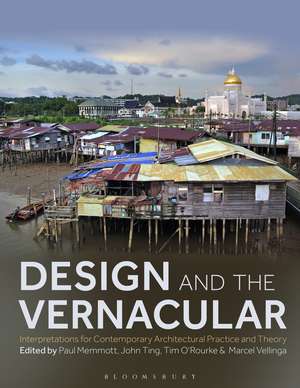Design and the Vernacular: Interpretations for Contemporary Architectural Practice and Theory
Editat de Paul Memmott, John Ting, Tim O’Rourke, Professor Marcel Vellingaen Limba Engleză Hardback – 27 dec 2023
Preț: 597.22 lei
Preț vechi: 857.86 lei
-30% Nou
Puncte Express: 896
Preț estimativ în valută:
114.27€ • 119.31$ • 94.58£
114.27€ • 119.31$ • 94.58£
Carte disponibilă
Livrare economică 14-28 martie
Preluare comenzi: 021 569.72.76
Specificații
ISBN-13: 9781350294301
ISBN-10: 1350294306
Pagini: 320
Ilustrații: 65 bw illus
Dimensiuni: 189 x 246 mm
Greutate: 0.45 kg
Editura: Bloomsbury Publishing
Colecția Bloomsbury Visual Arts
Locul publicării:London, United Kingdom
ISBN-10: 1350294306
Pagini: 320
Ilustrații: 65 bw illus
Dimensiuni: 189 x 246 mm
Greutate: 0.45 kg
Editura: Bloomsbury Publishing
Colecția Bloomsbury Visual Arts
Locul publicării:London, United Kingdom
Caracteristici
The book responds to the search for new forms of architecture and urban design that are relevant to the contemporary political and socio-economic drivers of new regionalism styles, tourism industries, and the re-establishment of the characters of place, city and landscape
Notă biografică
Paul Memmott is a trans-disciplinary researcher (architect/anthropologist) and the Director of the Aboriginal Environments Research Centre (AERC) and the Indigenous Design Place (IDP) at the University of Queensland, Australia.John Ting is an architect, researcher and educator. He teaches in the architecture program at the University of Canberra, Australia.Tim O'Rourke is Health Safety and Wellness Chair and Senior Lecturer in Architecture at the University of Queensland, Australia.Marcel Vellinga is Professor of Anthropology of Architecture at Oxford Brookes University, UK.
Cuprins
List of ContributorsIntroduction, Paul Memmott and Marcel Vellinga Part 1: Design Practice and Research Methods in Applying the Vernacular to Contemporary Contexts1. The Architectural Vernacularisation of Pacific Aid Practice - Charmaine 'Ilaiu Talei, University of Auckland, New Zealand2. Te Whakapapa o nga Wharenui: A Genealogy of Maori Meeting Houses - Savannah Brown (Ngati Whatua ki Kaipara, Ngapuhi, Ngati Hine, Ngati Wai), Amber Ruckes (Tuhoe), Faye Mendes-Underwood (Ngapuhi, Te Rarawa), Aisea Fanamanu, Deidre Brown (Ngapuhi, Ngati Kahu) and Jason Ingham, all Waipapa Taumata Rau/University of Auckland, Aotearoa/New Zealand3. 'Tropical Architecture': Cultural Collisions and Reverberations in the Vernacular of Aotearoa New Zealand - Jacqueline McIntosh and Bruno Marques, Victoria University of Wellington, New Zealand 4. Linguistics and Architecture, Creolistics and History, or, is Norfolk Island Architecture (a) Creole? - Joshua Nash, founding editor of Some Islands Part 2: Bridging between Local Cultures and Influences of Modernity5. Is Vernacular the New Modern? Reflections on Movements, Changes and Preservation in Indonesia - Gabriele Weichart, University of Vienna, Austria6. Adaptive Uses of Traditional Windbreaks and Bough Shades for Indigenous Housing in Australia - Timothy O'Rourke, University of Queensland, Australia7. Building on Indigenous Homelands in Arnhem Land since the 1980s: Harnessing Appropriate Technologies and Partnerships as a New Procurement Vernacular - Hannah Robertson, University of Melbourne, Australia8. The Resurgence of Indigenous Knowledge in Adapting Vernaculars: Implications of Climate Change for Rimajol Architectural Traditions - James Miller, Western Washington University, USA9. Papua New Guinea's Vernacular Architecture, from Relics to Reframing Culture: Kunguma and Tubusereia - R. H. Rusch, J. H. N. Amar and L. A. Armitage, all Bond University, Australia Part 3: Bridging for Diasporic Peoples10. Archipelagic Views: Vernacular Transformation and Inter-Colonial Agricultural Trade Networks in the Late 19th Century Asia Pacific - Amanda Achmadi, Karen Burns, and Paul Walker, all University of Melbourne, Australia11. Hand in Hand with Crossed Top Plates: Mapping the Contribution of Chinese Carpenters to the Production and Installation of Melbourne's Prefabricated 'Singapore Cottages' - John Ting, University of Canberra, Australia12. Diasporic Vernaculars? Different Australian Commercial Precincts - David Beynon, University of Tasmania, Australia and Ian Woodcock, University of Sydney, Australia13. Translating Spaces: Speculative Landscape Futures for New Climate Diasporas - Lizzie Yarina, Massachusetts Institute of Technology, USA, and Penny Allan and Martin Bryant, both University of Technology Sydney, Australia Part 4: The Vernacular in Postcolonial Modernisation, Politication and Nation-Building14. Historic Church Vernacular in the Cook Islands: Modernization, Conservation and Change - Carolyn Hill, University of Waikato, New Zealand15. Appropriating the Native: Shifting Definitions of the Vernacular in Twentieth-Century Philippine Architecture - Edson G. Cabalfin, Tulane University, USA16. From Cultural Symbol to Societal Sign: The Question of the Kanak Traditional House in Present-Day New Caledonia - Louis Lagarde, University of New Caledonia, New Caledonia and Yves-Béalo Gony, IANCP, New CaledoniaIndex
Recenzii
This is a welcome, timely volume drawing attention to local architectural traditions. Often overlooked, these represent generations of experience of particular places. They feature ingenious, often sustainable, solutions to local conditions. They are versatile and adaptable, and importantly today, they offer many people the scope independently to manage with climate change, being within their control, depending on local knowledge, skills and available materials.
